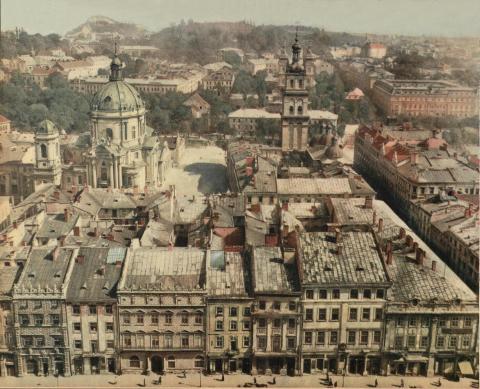Like other tourist places, it has coffee shops and craft beer pubs within walking distance of your AirBnB but not everyone is pleased by this heritage-based urban renewal.
Elderly people who liked and perhaps even thrived under the communist dictatorship of the past feel nostalgic for old tombs. And some younger people who only see the USSR in books may feel the same way, that "museification" - like Williamsburg in Virginia - is the only way to go for heritage conservation.

Diána Vonnák Durham University writes,"The Soviet Union is seldom thought of as a champion of heritage conservation, and for a good reason. Historic housing was notoriously unkempt, and protection efforts were concentrated on a select few monumental buildings ... But in some cases, Soviet-era conservation had bigger ambitions than the upkeep of buildings. Downtown Lviv was a “historic and architectural reserve” that enjoyed federal protection (the highest possible level) from 1975. There were no coffee shops, and hotels were placed around the historic zone, rather than inside it."
Is that better? No. We're in a modern era where everyone wants to believe each issue is a shade of grey, but no matter what you may think about communism as an academic ideal, and it will only ever be a thought experiment, or socialism as whatever socialism is claiming to be this month, if the USSR did it, it was wrong. Mao, Hitler, and Stalin, nothing in history compares to the evils those three did in a short period of time.
Williamsburg works because people will pay to go there. It's a 2 hour drive from DC. No one gets on a plane trip to go there to be told you can't get a cup of coffee. Museums have their place, and that place is where donors are willing to shell out a lot of money to sit on a Board of Directors, which is not Lviv or most cities in eastern Europe. For everyone else there is tourism and that only works if people want to visit.
When I lived in New York City, I went to lots of places from the past. I went to Hell's Kitchen because Frank Miller's "Daredevil" comics of the late 1970s and early '80s brought the seedy failures of unchecked government control to life. I went to the building where Billy Joel was photographed for his "52nd Street" album. None of it is still there, and Manhattan is not worse off for that. You'd never know you were in Hell's Kitchen unless you saw a sign for a Hell's Kitchen Wine Bar and the Lexus dealership.
The USSR wanted to put the past into a bottle because the world needed to stay static for their economic model to work. People could never want more. A giant chink in the USSR armor was created when the news entertainment program "60 Minutes" ran a program on poverty in America. Party leaders in the USSR were thrilled and used it for propaganda throughout the country but they were so far out of touch they didn't see what Soviet citizens saw - that even the poorest people in America still had a microwave and a TV. They weren't standing in lines to get a ration of toilet paper. History had passed Soviet leadership by.
History is dynamic and always was. In every case it has been written from a point of view. When the point of view was Soviet leadership, Habsburg and Polish heritage in Lviv was ignored and only symbolism that would boost the USSR will be maintained. That is how government works.
If people want to visit, even if it's not authentic, with no one throwing garbage out windows, it's still generating resources that can be used to keep heritage alive. And part of that money can be used to preserve specific buildings rather than turn them into coffee shops. It will work, as long as government doesn't get to decide.



Comments